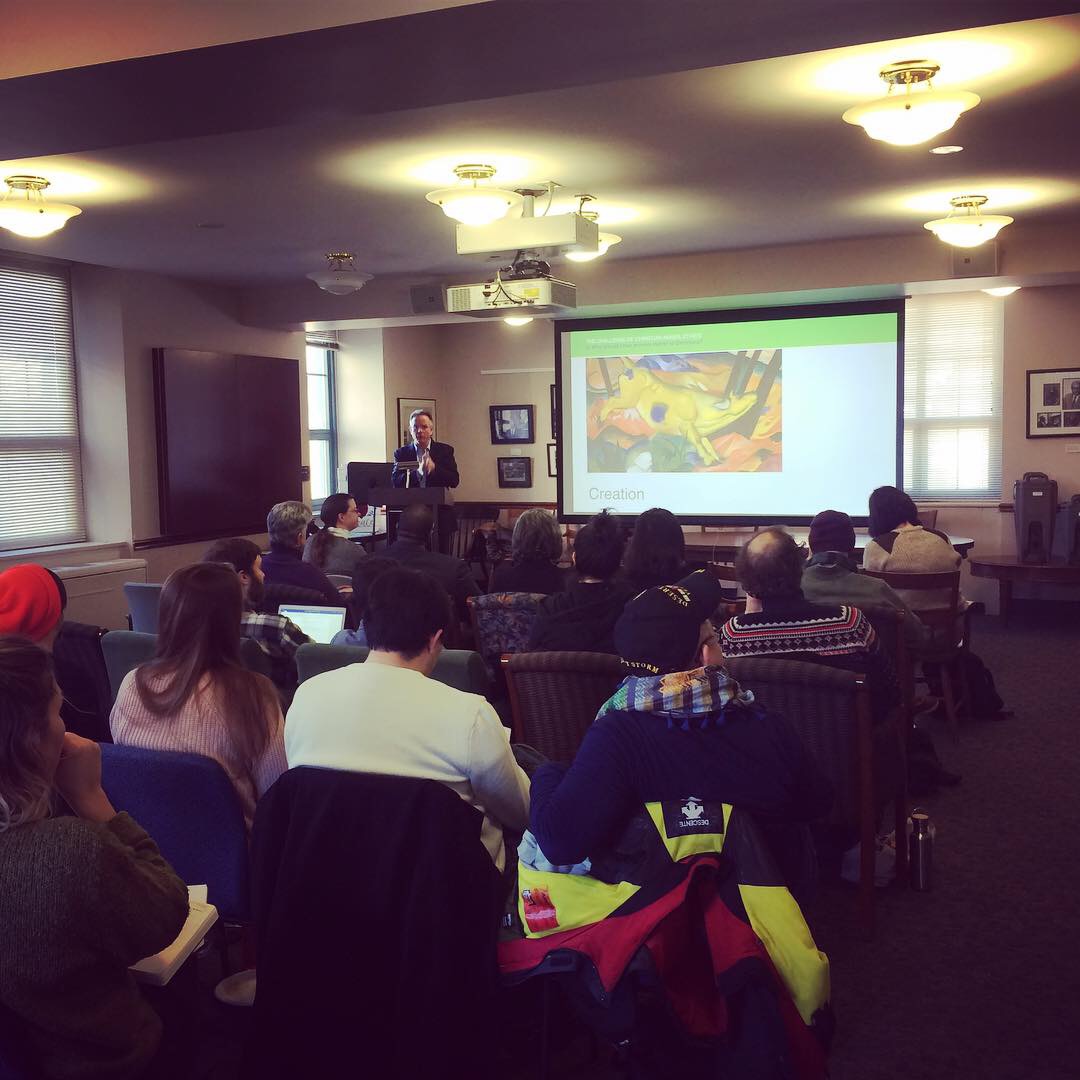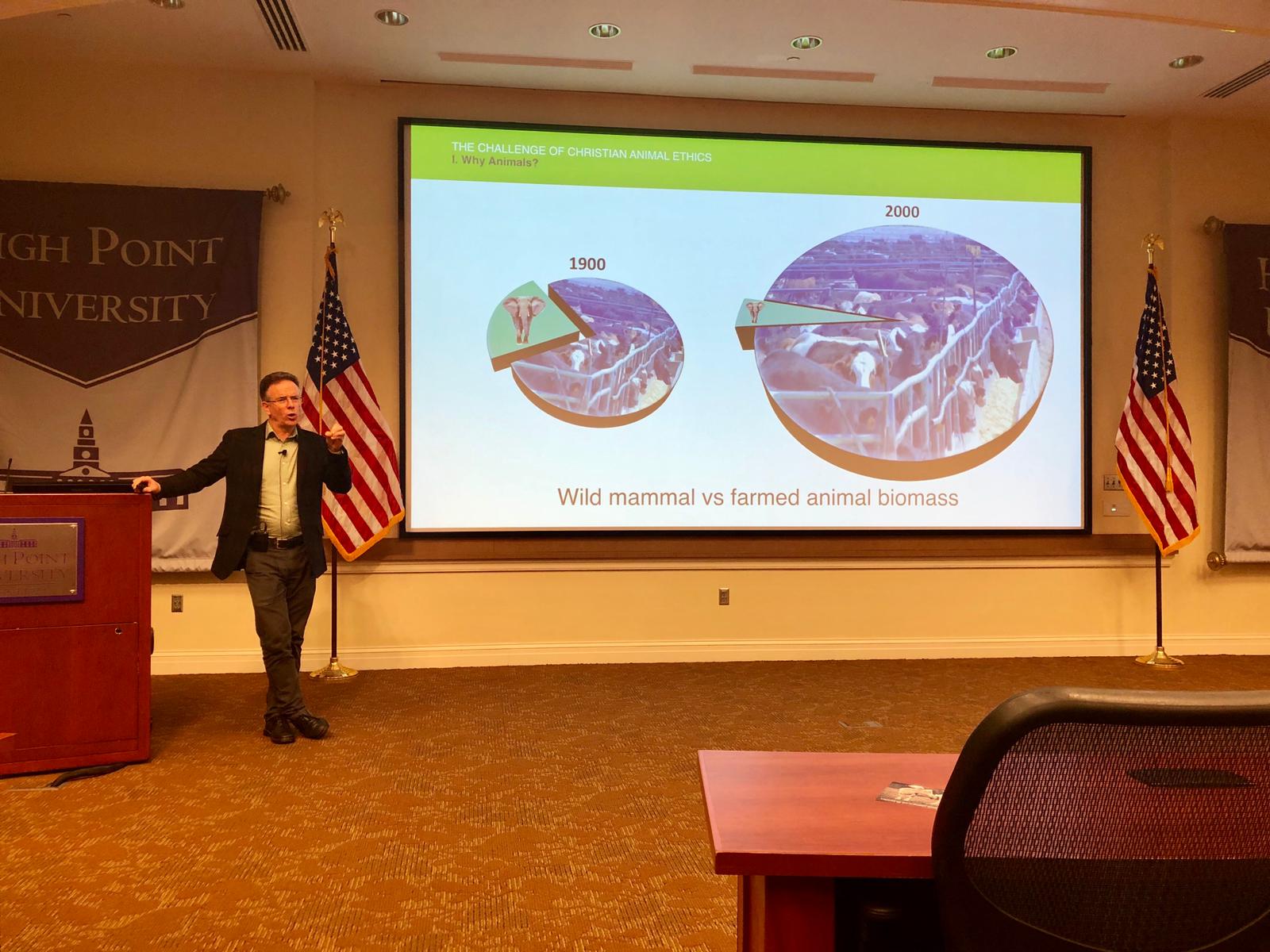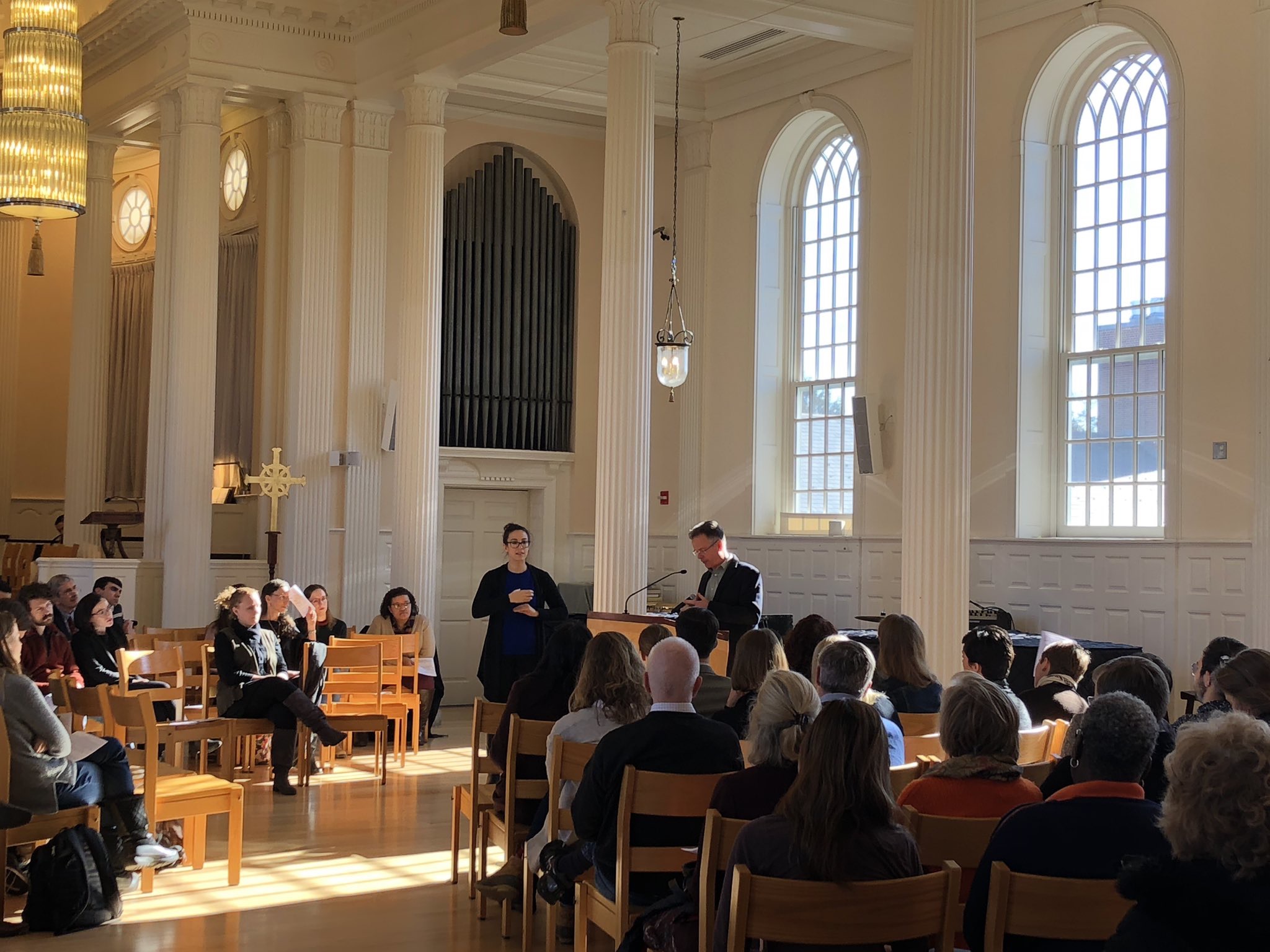Check out this video that the University of Chester produced of CreatureKind co-founder David Clough talking through the basic ethical issues of using animals for food!
Reflections from the On Animals North American Book Tour
by David Clough
The On Animals North American book tour is complete! In numbers: 31 days, lectures and seminars at 21 venues, combined audience of over 1000, 9 institutional food policy meetings, well over 100 books distributed.






I'm most grateful to hosts for the warm welcome received at each stop: Yale Divinity School, Boston University School of Theology, Harvard Divinity School, Harvard Law School, Christ Episcopal Church in Rockville MD, Georgetown University, Wesley Theological Seminary, University of Virginia, High Point University, Duke Divinity School, Wheaton College, Anabaptist Mennonite Biblical Seminary, Notre Dame University, Santa Clara University, Fuller Theological Seminary, Azusa Pacific University, University of San Diego, Regent College Vancouver, Vancouver Humane Society, and University of Victoria. Thanks too to Ilana Braverman for her expert coordination of the tour, and my CreatureKind co-director Sarah Withrow King who co-directed and accompanied.
Remarkably, in every venue, across a very wide range of theological perspectives and convictions, audiences responded enthusiastically to the argument that Christians have strong faith-based reasons to reduce consumption of animal products and move to higher welfare sourcing, and showed willingness to make practical changes in response. This gives me a great deal of hope that CreatureKind can be successful in catalysing change so that it becomes routine for Christian institutions to attend to their consumption of animal products as a faith issue. If you know of institutions interested in getting help from CreatureKind to engage in this area, please get in touch.
Excitingly, the positive response to this tour has helped confirm plans for a follow-up speaking tour of Australia and New Zealand in June 2019, which will take me to Brisbane, Auckland, Dunedin, Wellington, Melbourne, Canberra, Sydney, and possibly Hobart. If you live in Australia or New Zealand and would like to assist with book tour events there (set-up, sign-up, book donations), please send us a message with the subject line: Book Tour Help.
Objections to a Christian Food Ethic Treating the Consumption of Animals
The following is an excerpt of a paper ("Consuming Animal Creatures: The Christian Ethics of Eating Animals") written and given by David Clough at the Society for the Study of Christian Ethics annual meeting and published in the journal Studies in Christian Ethics. Read the full article.
by David Clough
David Clough
We are rightly sceptical about ethical arguments for radical positions, so before presenting arguments in favour of my position, let me consider three potentially fatal points that would quickly defeat the argument I am seeking to develop.
First, it seems unlikely that the vast majority of Christians today and in past generations could be in error in failing to recognise that their faith required abstention from most animal products. There is a strong and plausible argument from conservatism that should make us pause before accepting this judgement, and a parallel requirement on anyone advancing such a claim to provide an error theory explaining how things could have come to such a pass. My explanation for this is that the ways in which farmed animals are raised has changed radically and Christians, together with others, have been inattentive to these changes. I was shocked when I first came across the claim, not so long ago, that the first large-scale rearing of farmed animals exclusively for meat was in England in the late eighteenth century: up to that point meat was largely a by-product of keeping animals for other reasons, such as milk, eggs and wool. Meat was a cash-crop made possible by the Highland clearances in Scotland and the enclosures in England, displacing the largely arable agriculture of the poor, and, as Percy Bysshe Shelley noted in 1813, causing wastage of food productivity ‘absolutely incapable of calculation’.(1) The intensification of farmed animal production has developed over the past two hundred years since, but accelerated rapidly from the mid-twentieth century. Most farmed animals are now raised in ways that would be unrecognisable in comparison to conditions only a few decades ago. Broiler hens are a particularly extreme example: bred through intricate multi-generational programmes to reach slaughter weight at only 35 days old, their young legs unfit to support their unwieldy bodies, living the entirety of their lives in warehouses with artificial night and day, automated feeding and climate control, with human interaction restricted to a daily patrol to remove the dead, and finally stuffing them into crates for transport to slaughter. I still remember the experience of holding a straggly 16 day old hen in the midst of a huge broiler shed, surrounded by 26,000 of its fellows, with 23 similar sheds nearby, filled with the 600,000 birds that had been delivered together as day-old chicks two weeks previously. I had the strong sense that these animals were not being treated as animals, but as a crop, grown for harvest. The hen I held had only just lost its fluffy yellow chick feathers, yet was nearly halfway through its life. Pigs fare little better: most are also raised indoors in crowded conditions where farmers often resort to cutting off their tails to reduce the injuries from aggression and boredom that such intelligent and socially complex animals experience in such a monotonous environment.
Organic, free-range, family run chicken farm. Photo by Jo-Anne McArthur | We Animals
My point is that most of what now generates the need for radical changes in the Christian ethics of consuming animals is radical changes in farmed animal practice—changes which the farming industry has understandably not been active in publicising to consumers, and of which most consumers have therefore been unaware.
Therefore, the act of eating chicken today is different ethically from the act of our grandparents eating chicken, which they did much less frequently because before the invention of broiler hens chicken was a luxury compared with cheaper alternatives such as beef.(2) My position does not imply a retrospective judgement that our grandparents were wrong in eating farmed animals, but that the nature of the industry now is that we almost always are. It is also helpful to note that my position is also not a retrospective judgement in relation to what Jesus ate, which is commonly raised in discussions of Christian vegetarianism. Animals were not raised intensively in first-century Palestine, so my argument that intensively raised farmed animals should be off the table for Christians do not apply to Jesus’ dietary choices. In summary, I am arguing that the primary reason most Christians have not recognised the ethical problems associated with eating animal products is that farmed animal practice has changed comparatively recently and we have failed to attend to and appreciate the ethical implications of this change.
Rescued rooster. Photo by Jo-Anne McArthur | We Animals
A second potential way of defeating my argument that Christians should not consume products derived from farmed animals that have not been allowed to flourish as fellow creatures of God begins from New Testament teaching. ‘Do you not see that whatever goes into a person from outside cannot defile, since it enters not the heart but the stomach, and goes out into the sewer?’ (Mk 7:18-19). These scatological words of Jesus recorded by Mark and echoed by Matthew (Mt. 15:11, 16) seem to short-circuit any Christian food ethics, especially as Mark adds the parenthesis that in saying this Jesus declared all foods clean. Other New Testament passages echo this license to eat freely: Jesus allows his disciples to pluck heads of grain on the Sabbath and eat them (Mk 2:23- 24 and par.); Paul states that only those weak in conscience are concerned about eating meat offered to idols, and states that eating or not eating is irrelevant to our relationship to God (1 Cor. 8:4-8; cf. Rom. 14:2); and Peter receives a shocking vision in which he is told to kill and eat all kinds of animals, because God has made them all clean (Acts 10:9- 16). Clearly, the very particular context of early Christian communities negotiating their relationship with Jewish food practices is a crucial background here, and is inappropriate to determine Christian food ethics entirely within this context, but the texts do not encourage Christian attention to the ethics of eating. Given this early history, it is surprising that Christian monastic movements so often made stringent dietary demands of their members, and that traditions of fasting became so widespread, but the Reformation questioned this practice, with Luther reemphasising Paul’s position that neither eating nor fasting counts for anything,(3) and much more recently in 1966 Roman Catholic fasting requirements were relaxed.(4) All this seems an unpromising context for Christian attention to the ethics of what we eat.
What we consume, including what we take in through our mouths, has obvious and problematic impacts on other humans, on non-human animals, and on the wider environment.
Yet what we eat is of very clear and direct relevance for Christian ethics, as captured memorably in the title of Ron Sider’s 1978 book Rich Christians in an Age of Hunger.(5) What we consume, including what we take in through our mouths, has obvious and problematic impacts on other humans, on non-human animals, and on the wider environment. To take one example: we currently devote 78 per cent of all agricultural land to raising farmed animals, and feed more than one third of global cereal output to those animals.(6) Philosophers and theologians from Plato onwards have noted that raising animals for meat is an inefficient use of land, and it is abundantly clear that fewer people would go hungry and thirsty if the land were used to grow crops instead, where this is possible.(7) We may disagree about the ethical implications of this observation, but we cannot reasonably use the biblical passages cited above to deny its relevance for Christian ethics.
As the growing literature in this area confirms, twenty-first-century Christian ethics cannot therefore afford to leave food ethics beyond its range of concerns.(8) There is nothing wrong in eating an apple as such, but if food is scarce and eating it would be to take more than our share, then the decision to take and eat it is obviously an ethical one. Similarly, if the apple has been produced under conditions that fail to provide adequately for agricultural workers, or using pesticides that poison sources of water, or do other unwarranted damage to other animals or the environment, this wider context makes the decision to purchase and consume it relevant to ethics. In a Christian context what we eat is an ethical question because of the implications of our consumption for fellow creatures of God. This is the basis for a Christian ethics of food.
On dairy and veal farms, babies like this one are taken from their mothers within hours of birth and placed alone into small crates. Photo: Jo-Anne McArthur | We Animals
In this article, I want to focus on a particular part of this issue: the ethics of consuming animal products. Here we encounter a third possible defeater to the argument I announced. You may agree that Christian food ethics should properly take account of the implications of our consumption for our human neighbours, but deny that we should be concerned about the impacts on other animals. There are good theological foundations for such a lack of concern for animals. In Augustine’s discussion of the Decalogue prohibition of murder in The City of God, he notes that some people have said that the prohibition of killing should be extended to beasts and cattle, but that this would lead to a reductio ad absurdam because if it is unlawful to kill animals, why not plants as well? To avoid involving ‘ourselves in the foul error of the Manichees’, Augustine draws on the Greek idea of the soul as threefold: plants have a nutritive soul, animals have a sensitive soul in addition, but humans uniquely have a rational soul. ‘Thou shalt not kill’ does not refer to plants because they are not sensitive, and does not refer to animals because they have no society with us in reason, he argues, and because God has ordained that their deaths and lives may justly serve our use.(9) When Aquinas considers whether it is permissible to kill any living thing in the Summa theologica, he cites Augustine’s argument about animals being irrational, and adds Aristotle’s view in the Politics that plants were created for the sake of animals and animals for the sake of human beings.(10) Aquinas draws on Aristotle to argue that, just as some human races are ‘intended by nature for slavery’ so that it is just to go to war to enslave them, so we can see animals as naturally enslaved for the use of others.(11) Elsewhere in the Summa, Aquinas argues that animals are excluded from consideration in relation to both justice and charity.(12)
Christians have biblical and theological grounds for recognising animal creatures as different from plants, and these differences have implications for how we treat them
Let us agree to agree with Augustine and Aquinas that the Decalogue does not prohibit killing animals, and agree to disagree absolutely with Aristotle and Aquinas in their view that there are humans who are naturally ordered to be slaves to others. What should we make of the argumentation between these two points? First, while Augustine is right that killing animals is not prohibited here, he is wrong that we have no way of recognising the difference between killing animals and plants. As we shall see below, Christians have biblical and theological grounds for recognising animal creatures as different from plants, and these differences have implications for how we treat them. Our rejection of Aquinas’s analogy from races naturally destined to be slaves ought to lead us to question the analogous Aristotelian logic that plants were created for animals and animals for humans. Genesis 1, notably, provides no basis for such a claim: the creatures of each day are declared good in themselves without reference to their utility to any other creatures.(13) Genesis 1 gives humans dominion over other animals, but its specification of plants as food both for animals and humans suggests that this dominion does not include the taking of their lives, and the peaceable coexistence of humans with the animals in Genesis 2 strengthens the case for a dominion that does not involve killing. After the fateful events of Genesis 3, and after the flood God causes in eventual response, God gives permission for the first time for humans to eat other animals provided they do not consume their lifeblood (Gen. 9.3-4), but we might well follow Luther and many other theologians in interpreting this as a departure from the ideal of Genesis 1, especially in the light of prophetic visions of an end to animal sacrifice and the Messianic reign bringing peace between humans and animals, and Paul’s anticipation of the whole creation freed from its groaning bondage.(14) We should also question Augustine’s use of the criterion of reason to identify creatures we may and may not kill: there are human beings not capable of reason whom we rightly wish to protect, and we need to recognise that the abundant examples of animal reasoning offered in contemporary animal studies—such as the politicking of chimpanzees, the abstract logic of parrots, the innovative tool-fashioning of crows, and the ability of dolphins to parse grammar, to take a few of myriad possible examples—mean the Greek idea of a binary divide between humans and other animals on the basis of rationality is unsustainable.(15) The early fourteenth-century English commentary on the Ten Commandments, Dives and Pauper, seems preferable to Augustine and Aquinas’s discussions at this point. It notes that Genesis 9 must mean animals are excluded from the Decalogue prohibition on killing, but interprets not consuming animals with their blood as prohibiting cruelty, ‘For God that made all has care of all, and he shall take vengeance on all that misuse his creatures’.(16) Karl Barth, influenced by Albert Schweitzer’s vision of reverence for all life, recognised the serious ethical attention Christians need to give to fellow animal creatures, stating that animals belong to God, not to human beings, and that therefore any human treatment of other animals must be ‘careful, considerate, friendly and above all understanding’.(17) While Barth considers that this could include killing other animals for food, he judges that such killing could only be obedience to God where it is done under the pressure of necessity. Otherwise, Barth comments strikingly, such killing is nothing less than murder.(18) Augustine, Aquinas, the author of Dives and Pauper, and Barth are right to recognise that Genesis 9 is a strong argument against the idea that vegetarianism is a universal requirement for Christians, but their positions do not indicate that animals are of no moral account, and we are clearly not necessarily guilty of the ‘foul error of the Manichees’ in considering that Christians might have faith-based reasons to be concerned about their treatment of animals.
Photo: Jo-Anne McArthur | We Animals
My judgement, then, is that there are no convincing fundamental objections to a Christian ethics of food, nor to thinking Christianly about the ethics of eating animals in particular. I will return to some more specific objections to my argument below, but in the next section I proceed with my positive argument for the position that Christians have strong faith-based reasons to avoid consuming animal products derived from animals that have not been allowed to flourish as fellow creatures of God.
You can read the full article by following this link.
Footnotes:
1. Tristram Stuart, The Bloodless Revolution: A Cultural History of Vegetarianism from 1600 to Modern Times (New York and London: W. W. Norton and Co., 2006), p. 403; Shelley’s A Vindication of Natural Diet quoted by Stuart, pp. 405–406.
2. A. Godley and B. Williams, Democratizing Luxury and the Contentious ‘Invention of the Technological Chicken’in Britain, Business History Review (Reading: Centre for Institutional Performance, University of Reading, 2009), p. 1.
3. See, for example, Luther’s commentary on Gal. 6:15 in Lectures on Galations (Martin Luther, Luther’s Works, eds Helmut T. Lehmann, and Jaroslav Pelikan (Philadelphia, PA: Muhlenberg Press, 1958), vol. 27, p. 138).
4. In Pope Paul VI’s Apostolic Constitution Paenitemini he allowed local bishops to replace Friday fasts from meat with other forms of penance. Pope Paul VI, Paenitemini: On Fast and Abstinence (Rome: Vatican, 1966), ch. III.
5. Ronald J. Sider, Rich Christians in an Age of Hunger: Twentieth Anniversary Edition (London: Hodder & Stoughton, 1997 [1978]).
6. David Clough, On Animals: Vol. II. Theological Ethics (London: T & T Clark/Bloomsbury, forthcoming 2017), ch. 2.
7. Stuart, Bloodless Revolution, p. 402, citing Plato’s Republic, 373d; Clough, On Animals II, ch. 2.
8. See, for example, Stephen H. Webb, Good Eating, The Christian Practice of Everyday Life (Grand Rapids, MI: Brazos Press, 2001); Rachel Muers and David Grumett (eds), Eating and Believing: Interdisciplinary Perspectives on Vegetarianism and Theology (London: T & T Clark, 2008); L. Shannon Jung, Food for Life: The Spirituality and Ethics of Eating (Minneapolis, MN: Fortress Press, 2004); Norman Wirzba, Food and Faith: A Theology of Eating (Cambridge: Cambridge University Press, 2011).
9. Saint Augustine, The City of God, ed. R. V. G. Tasker, trans. John Healey (London: Dent & Sons, 1945), I.19.
10. Thomas Aquinas, Summa Theologica, trans. Fathers of the English Dominican Province (London: Blackfriars, 1963), II-II, 64.1, citing Aristotle, Politics, trans. C. D. C. Reeve (Indianapolis, IN: Hackett, 1998), I.8, 1256b.
11. Aquinas, Summa Theologica, II-II, 64.1.
12. Aquinas, Summa Theologica, 1.2, qu. 102, a. 6; Aquinas, Summa Theologica, 2.2, qu. 25, a. 3. It is important to note that there are other much more positive dimensions of Aquinas’s thought for engaging theologically with animals. For discussion of these, see Judith A. Barad, Aquinas on the Nature and Treatment of Animals (San Francisco, CA and London: International Scholars, 1995) and John Berkman, ‘Towards a Thomistic Theology of Animality’, in Celia Deane-Drummond and David Clough (eds), Creaturely Theology: On God, Humans and Other Animals (London: SCM, 2009).
13. Gen. 1:4a, 10b, 12b, 18b, 21b, 25b.
14. Martin Luther, Lectures on Genesis, Chapters 1–5, Luther’s Works, vol. I, ed. Jaroslav Pelikan (Saint Louis, MO: Concordia, 1958), p. 36; Isa. 1:11; 66:3; 11:6-9; 65:25-26; Rom. 8.19-22.
15. David Clough, On Animals: Vol. I. Systematic Theology (London: T & T Clark/Continuum, 2012), pp. 30, 69–70.
16. Priscilla Heath Barnum (ed.), Dives and Pauper (Oxford: Early English Text Society/Oxford University Press, 1976), p. 35 (my rendition in modern English).
17. Karl Barth, Church Dogmatics, vol. III/4, ed. G. W. Bromiley and T. F. Torrance, trans. A. T. MacKay et al. (Edinburgh: T & T Clark, 1961), p. 352.
18. Karl Barth, Church Dogmatics III/4., pp. 354–55. As noted above, I am not arguing in this article for Christian vegetarianism or veganism, but Barth’s argument here seems to be the most promising starting point for such an argument, given that for most humans today, killing animals is not necessary to gain adequate nutrition.
The Reconciliation of Creation: Especially Cows
by Margaret B. Adam
This article was originally delivered as a sermon at Hertford College Evensong.
The readings:
- Isaiah 11:1-9
- Psalm 148
- Colossians 1:15-20
In today’s psalm, all of creation is exhorted to praise God. The psalmist calls all people to praise the Lord. He also calls on angels, stars, skies, and seas to give their praise. And weather, hills, and trees. Sea monsters and wild land-animals, creepy crawly animals and birds. And also...cows. Let the cows praise the Lord! Praise God, all you cows!
What does it look like for a cow to praise God?
Photo: Jo-Anne McArthur | We Animals
Praise is what creatures do when they are living out their creaturely particularity to the glory of God. To praise, to glorify God, is to rejoice in God, as a creature of God. Humans often praise God with words and reason. Humans also praise God silently, without reasoned thought, newly born, approaching death, in stillness and in action. Likewise, other animals and the rest of creation all praise God in their own ways.
As we sang earlier: ‘All creatures of our God and King, lift up your voices, let us sing: Alleluia, alleluia!’
Praise is a bodily function. Created bodies sing Alleluia to God in their own distinctive voices and movements. Stars shine, winds storm, mountains stand, slugs—slugs excrete mucous and slide along it to find slug food. This is their praise, their rejoicing in the Lord. Cows praise God by flourishing: by grazing outdoors, chewing their cud, nursing their calves, brushing off flies, dozing, and mooing their version of rejoicing.
But, many dairy cows do not flourish. Industrial farming deprives cows of joy and decreases their capacity to praise God in their created cowness.
Photo: Jo-Anne McArthur | We Animals
Of course, much of creation is not free to flourish and praise God as created. This is a world full of brokenness and suffering, fractured and unjust relationships. In that brokenness, we humans participate directly and indirectly in the use, abuse, and early death of other human and nonhuman animals, every day. Increasingly, in England, human-cow relationships reflect consumers’ desire for cheap milk, which drives smaller-scale farms out of business and supports the growth of large industrial dairy farms. Human preferences inhibit cow praise, by cutting short their lives and treating them as objects for production rather than as creatures of joy.
The children’s picture books of your childhood and mine show cows in abundant grass and sunshine, accompanied by other barnyard animals, and perhaps milked by The Farmer, or, The Farmer’s Daughter. These cows have names and personalities. They look happy and relaxed.
The life of a factory farmed cow looks nothing like the lives of cows in children’s books—or, for that matter, any on farms anywhere at anytime in history before the late 20th century.
Industrial farms keep cows in cages just barely big enough for their bodies to fit. On zero-grazing farms, the cows spend their entire lives inside. Cows are forcibly, artificially inseminated when they are 15 months old. Farm workers remove newborn calves at 2 days old, leaving the mothers bereft. Female calves are raised like their mothers. Male calves face either immediate death or a slightly delayed death if kept for veal. Cows are repeatedly impregnated so that they will be lactating continuously. In the last 40 years, the industry has doubled milk production per cow. By the time the mothers are about 5 years old, their bodies are so worn out from over-production that their milk is no longer high quality, and they are slaughtered for human food; whereas in more cow-friendly living conditions, they might live another 10 to 15 years.
Sasha, rescued from the veal and dairy industries. Photo: Jo-Anne McArthur | We Animals
This is a gentle and muted description of the treatment of factory-farmed cows. You can watch videos online that show just how cruelly the cows are treated and just how grim the workers’ jobs are. There is no joy there.
This is not the end, the purpose, of creation. Scripture offers ample images to help us identify broken relationships and redirect us toward the radically harmonious relationships to come in the fullness of time.
The prophet Isaiah schools the people of God in faithfulness, calling out their failures and redirecting them toward rightly ordered relationships. When the whole world is transformed by righteousness in the Lord, Isaiah proclaims, no creature will need to suffer and die in order that other creatures may thrive. Humans will lay down their swords and machines of destruction; all animals will set aside their aggression, carnivory, and fears. Note the extra attention Isaiah gives to cows. He says:
The wolves, lambs, leopards, and goats will live comfortably together. Calves and lions will hang out and eat straw together. Cows and bears will graze together, while calves and baby bears nap together. Human children, still nursing, will play where the cobra lives, and weaned children will put their hands safely into the adder’s home. No creature will hurt or destroy any other creature.
Today, Isaiah might well add: ‘Cows will nurse their calves and humans will nurse their babies. Cows and humans will all enjoy fresh air and freedom from oppression’.
Unrealistic? Isaiah is not aiming at realism here. Realism claims that some creatures must destroy other creatures. Human animals use realism to defend the need to treat nonhuman animals as products. Isaiah names the brokenness that disrupts all creaturely flourishing, not just human flourishing. And he points to the fullness of creation freed from normative abuse. Even if the peaceable kingdom seems impossible now, it’s clear that industrial farming does not reflect or anticipate that kind of flourishing.
The Christian narration of salvation traces God’s creation through humanity’s persistent rejection of both God and the goodness of creation, and through the systemic effects of cumulative human brokenness—brokenness too pervasive for humans to fix. All of creation suffers together from human sinfulness and groans together in hope of a most unrealistic salvation.
Paul, in his letter to the Colossians that we heard earlier, proclaims the salvation of creation—the salvation of humans and cows—that comes through Christ who reconciles creation. Christ, fully human and fully the divine Son of God, dies a creaturely—and very realistic—death. That death does not bind Christ to the limits of death. He lives again, beyond death. He releases all of creation with him, from sin and the deathly effects of sin, in the reconciliation of all things.
Paul explains that
...all things have been created through Christ and for Christ.
Christ himself is before all things, Christ holds all things together in him.
For in Christ all the fullness of God was pleased to dwell, and through him God was pleased to reconcile to himself all things--all of creation-- whether on earth or in heaven, by making peace through the blood of his cross.
So, Christ holds together the divisions we cause. And Christ establishes a creation-wide reconciliation of all relationships, that reaches beyond the divisions of species and the separation of death.
Christ’s reconciliation addresses every thwarted opportunity for joyful flourishing, for praising God—sibling rivalries, political infighting, warfare, hunters and their prey. It includes all those involved in the industry of intensive dairy farming—from corporate leaders, to factory workers, to cows, to consumers. Christ suffered and died for humans and for cows, so that both can flourish without harming the other, along with lions, leopards, little goats, and adders.
Photo: Jo-Anne McArthur | We Animals
But, where is this reconciliation? Where are the signs that systemic sin is undone? Why does zero-grazing seem a sensible strategy for large-scale farms? Why is it still so hard to eschew all animal products? Part of the answer is: I don’t know. As a creature—and a sinful creature at that—I have no God’s-eye view on the pace of the fulfilment of creation; but scripture, the saints, and the teachers of the church, steadfastly remind me that Christ has both already effected that reconciliation and is still effecting it.
The other part of the answer is that Christian ethics directs us to live into that for which we hope. The ethical response to systemic brokenness is to embrace that already/not yet transformation with expanded imaginations and critically-examined practices.
First, we can demonstrate, by our actions, that we don’t need to abuse other creatures for our own pleasure. It is not necessary to purchase cow milk when there are ample alternative milks on the store shelf. Colleges, restaurants, friends and family often offer a vegetarian or vegan option for dinner. If you are looking for a quick meal, check out the plant-based prepared foods in the freezer and refrigerated sections at the store. If you cook for yourself, add one easy vegan meal to your repertoire. These are all ethical decisions you can make without even going out of your way. These are relatively simple ways to show that it is not necessary to deny one animal’s flourishing for the sake of another animal’s flourishing—our own flourishing.
Second, learn about what happens on dairy farms. Do a little research on industrial farming. Visit a local small farm. Compare conditions on larger and smaller farms. Meet some cows. Trace the sources of your food, drink, and clothing. Incorporate these considerations into your daily life practices. In the US, over 90% of dairy products come from industrial farms. In the UK, the percentage is closer to 70%. It may be difficult to change the trend toward mega-farms, but consumer choices do speak loudly.
Third, make connections with other people asking similar questions. Share concerns, insights, and experiences. Eat together. Challenge each other to adopt more peaceable creaturely interactions. Hold each other accountable.
And, above all, let’s try not to keep other creatures from flourishing. Let’s work toward the end that all creation—including cows—may experience joy and glorify God in their particular creatureliness.
Praise God! All of creation, praise God.
And, especially, let the cows praise the Lord.
Photo: Jo-Anne McArthur | We Animals










